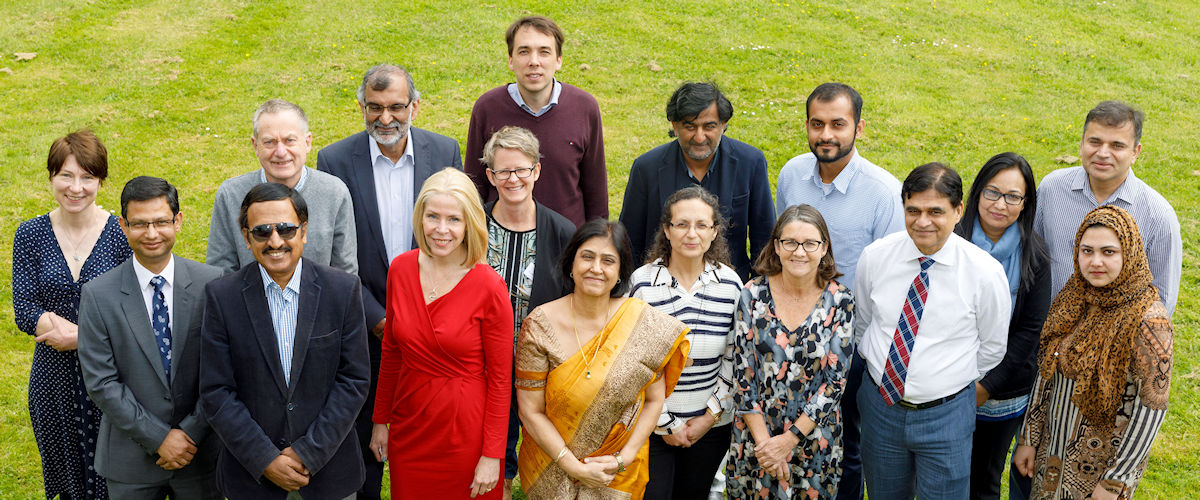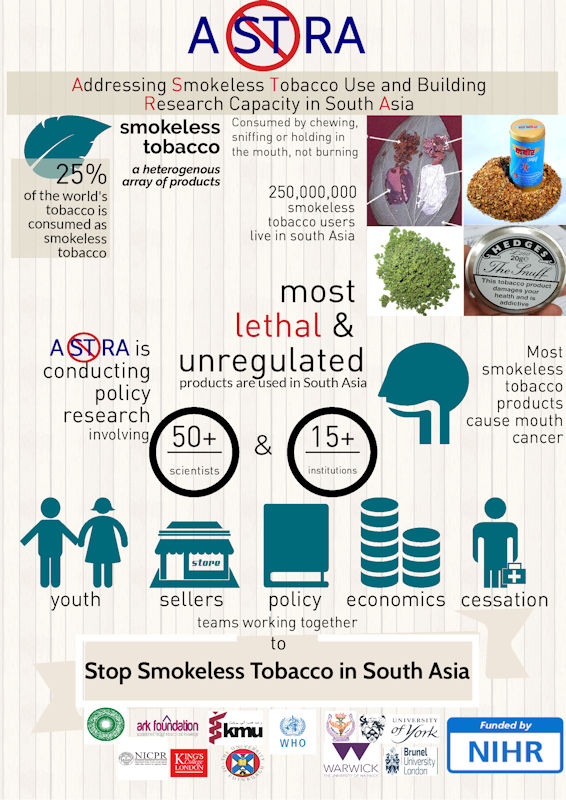
Addressing Smokeless Tobacco and building Research Capacity in South Asia (ASTRA)
ASTRA is a world-class, interdisciplinary group, aiming to reduce the substantial burden of disease caused by smokeless tobacco (ST). ST refers to tobacco products that are consumed without smoking. Such products are particularly popular in South Asia and include ‘chewing tobacco’ (e.g. paan, gutkha or zarda), as well as various other types of oral and nasal tobacco (like naswar). ST products have historically been assumed to be less harmful than cigarettes, so not very much research has been done on smokeless tobacco. However, ST is highly addictive and is known to cause cancers of the mouth and neck, as well as cardiovascular disease and pregnancy problems.

ASTRA’s international teams will carry out policy research and develop interventions to address the problems caused by the use of smokeless tobacco in South Asia. Our focus is on Bangladesh, India and Pakistan, where 80% of the world’s 300 million smokeless tobacco users live, and where the most harmful types of ST are favoured.
The World Health Organisation’s Framework Convention on Tobacco Control (WHO-FCTC) has set out tobacco control policies, aimed at improving global health by reducing tobacco demand and supply. In high-income countries, FCTC measures have had considerable success in reducing the harm caused by cigarettes. However, for smokeless tobacco, control policies are poorly developed and badly implemented, especially in low- and middle-income countries (LMICs).
Aims
- ASTRA aims to gather evidence about how the policies recommended by the WHO-FCTC are being implemented for ST in LMICs. This part of the programme will focus on young people, since 90% of ST users start their habit during adolescence.
- Another aim is to develop and evaluate interventions, such as behavioural support or medicines, to help adult ST users to quit.
- We also aim to build capacity, by training research teams at LMIC institutions to conduct high quality applied health research in Bangladesh, Pakistan and India.
- We will use this capacity to support wider tobacco control efforts in the South Asia region.
Funder: ASTRA is a three-year programme, with a budget of £2M, funded by the National Institute for Health Research, UK (NIHR)
Primary Investigators:
- Chief Investigator is Prof. Kamran Siddiqi at the University of York, UK. (Dept. of Health Sciences)
- Co-Director is Prof. Ravi Mehrotra (National Institute of Cancer Prevention and Research (NICPR), India)
- Programme Manager is Dr. Anne Readshaw at the University of York, UK. (Dept. of Health Sciences)
Other co-investigators at University of York are:
- Dr. Jappe Eckhardt (Dept. of Politics)
- Dr. Mona Kanaan (Dept. of Health Sciences)
- Faraz Siddiqui (Dept. of Health Sciences)
- Dr. Masuma Mishu (Dept. of Health Sciences)
Co-investigators from other institutions:
- Dr. Subhash Pokhrel (Brunel University)
- Prof. Ann McNeill (King’s College London)
- Prof. Linda Bauld (University of Stirling)
- Prof. Richard Lilford (University of Warwick)
- Prof. Paramjit Gill (University of Warwick)
- Prof. Aziz Sheikh (University of Edinburgh)
- Prof. Ray Croucher (Independent)
- Dr. Cath Jackson (Independent)
- Prof. Rumana Huque (ARK Foundation, Bangladesh)
- Dr. Amit Yadav (NICPR, India)
- Dr. Ravi Kaushik (NICPR, India)
- Prof. Suneela Garg (Maulana Azad Medical College (MAMC), India)
- Dr. M. M. Singh (MAMC, India)
- Prof. Javaid Khan (Aga Khan Medical University (AKU), Pakistan)
- Dr. Romaina Iqbal (AKU, Pakistan)
- Azmina Abdul (AKU, Pakistan)
- Dr. Zohaib Khan (Khyber Medical University (KMU), Pakistan)
- Prof. Arshad Javaid (KMU, Pakistan)
External Partner Organisations:
ASTRA is a new, international group, comprising experts from six UK Universities and five institutions from Bangladesh, Pakistan and India.
In addition to University of York, UK partner institutions are:
- Brunel University
- King’s College London (KCL)
- University of Stirling
- University of Warwick
- University of Edinburgh
Our South Asian partners include:
- ARK Foundation (Bangladesh)
- National Institute of Cancer Prevention and Research (India)
- Maulana Azad Medical College (MAMC) (India)
- Aga Khan Medical University (AKU) (Pakistan)
- Khyber Medical University (KMU) (Pakistan)
We are supported by key stakeholders, including:
- WHO SEARO (India)
- Cancer Research UK
- WHO Geneva (Switzerland)
- The Union/Vital Strategies (USA)
- National Cancer Institute (USA)
Contact us
Interdisciplinary Global Development Centre
igdc@york.ac.uk
01904 323716
Department of Politics and International Relations, University of York, Heslington, York, YO10 5DD, UK
Twitter
Contact us
Interdisciplinary Global Development Centre
igdc@york.ac.uk
01904 323716
Department of Politics and International Relations, University of York, Heslington, York, YO10 5DD, UK
Twitter